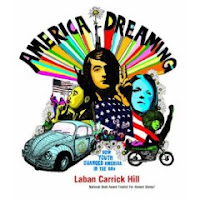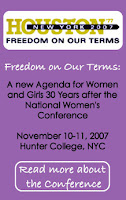 So this Saturday I spent some time at the Freedom on Our Terms conference, commemorating the 30th anniversary of the National Women’s Conference in Houston back in 1977. A few great quips from the afternoon plenary:
So this Saturday I spent some time at the Freedom on Our Terms conference, commemorating the 30th anniversary of the National Women’s Conference in Houston back in 1977. A few great quips from the afternoon plenary:
Rosie O’Donnell on the Bush Administration: “What they’re feeding you is McDonalds. It gives you diarrhea and ultimately it kills you.”
Rosie on Mos Def: “Mos Def said the best line on Bill Maher: ‘From Bush to Clinton to Bush to Clinton, they’re passing around the Presidency like a party joint.”
Rosie on the solution to it all: “Ingest art.”
Liz Holtzman on Bella Abzug in Congress: “They made her take her hat off, but they couldn’t shut her up.”
The spirit of Bella infused the afternoon. It was moving. The goal of the conference was to create “a 21st century agenda for action,” updating the planks from 1977. Two young women, Lala Wu and Kate Collier, coauthored a fabulous-looking document for the conference, called “The National Plan of Action: Then and Now.” It’s a great status report. Tons of younger women were in attendance. But I was frustrated by the lack of real intergenerational conversation during the bits that I saw.
It’s easy to be a critic, and I know how much goes into planning this kind of event. So hats off to the organizers, and I know that hearts are in absolutely the right place. But it bothered me that the line-up of younger women at the afternoon plenary were left with only a few minutes each to talk about their organizations, and that there was no time left for them to dialog amongst themselves, or with older feminists. The reason for the time crunch? From what I could tell, the movement veterans slated to speak–and there were many of them–had used up all the time and things were running late. But maybe there was another reason too? Maybe Rosie showed up late? (I came midway through her speech.) In any event, it was frustrating not to hear more from the young women on the stage at the end.
The media panel I went to, on the other hand, was fantastic–Laura Flanders, Emily McKahnn from The Motherhood, Sonia Ossioro (Pres. of NOW-NYC, which recently landed a media coup of their own), and Lauren Brill, a kick-ass young stringer for the WNBA. The room was so full, we were sitting on desks and window sills. The crowd spanned the ages, and the discussion could have gone on for hours. I kind of wish it had. I would have loved to have heard more from some of those in attendance–Shelby Knox was there! I’m looking forward to more of this kind of discussion at this year’s Women, Action, and the Media Conference, on March 28-30, at MIT.
(Photo cred. Check out this and some great photos from Houston 1977 here.)
 And speaking of the 1970s (I’m on a roll here with linking this week’s posts!), the median age of marriage for women in 1970 was 21; for men, 23. These days, according to the Census Bureau, the median age of marriage for women is just shy of 26; for men, 27. The age goes up with advanced degrees. So it comes as little surprise that more and more of us are meeting our matches (or mismatches as the case may be) on the job. A 2007 Careerbuilder survey reveals that almost half of all American workers will date a colleague at least once.
And speaking of the 1970s (I’m on a roll here with linking this week’s posts!), the median age of marriage for women in 1970 was 21; for men, 23. These days, according to the Census Bureau, the median age of marriage for women is just shy of 26; for men, 27. The age goes up with advanced degrees. So it comes as little surprise that more and more of us are meeting our matches (or mismatches as the case may be) on the job. A 2007 Careerbuilder survey reveals that almost half of all American workers will date a colleague at least once.








